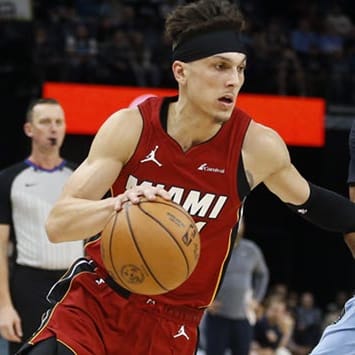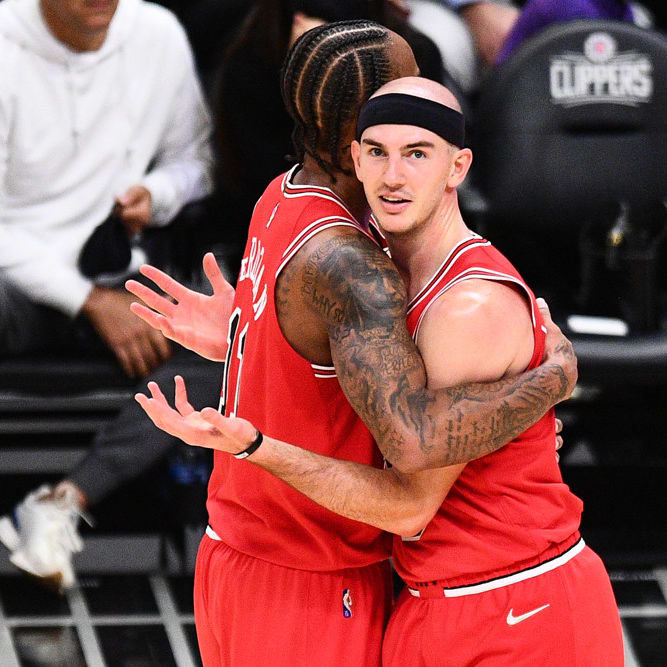This article is part of our Fielkow's Law NBA series.
Last Wednesday, the NBA announced that Jeff Taylor, a relatively unknown role player for the Charlotte Hornets, was suspended 24 games without pay following a guilty plea to misdemeanor domestic violence assault and malicious destruction of property. To which the collective fantasy basketball community responded, "Who cares?"1 Well, I'm going to go over a few reasons why we should all care.
1The "who cares" is, of course, only with regard to Taylor as a fantasy basketball commodity; we are not in any way minimizing what is a horrific crime in real life. The purpose of this article is to simply analyze the current NBA precedent and rules, as well as take a look at what the Taylor suspension means going forward for other players in similar situations.>
Let's start from the beginning. On Sept. 25, officers from the East Lansing (Michigan) Police Department arrested Taylor at a Marriott hotel. The arrest followed a report by hotel guests and staff that Taylor had violently pushed a woman, assaulted a security officer and damaged a hotel room door. The NBA's investigation,2 which included interviews with Taylor, Taylor's victim and key witnesses, revealed that the confrontation stemmed from a screaming argument between an inebriated Taylor and a woman described as his girlfriend. During the argument, Taylor aggressively shoved the woman from his hotel room and into the hallway. The shove was so hard that it propelled her into the door of the room across the hallway. Although she declined medical treatment, she suffered visible injuries to her head and arm.
2As he did following Donald Sterling's infamous recording, Silver launched a thoroughly detailed and confidential investigation into the incident. Silver, an attorney (unlike NFL commissioner Roger Goodell), retained a team of former prosecutors to interview witnesses and evaluate available evidence. Silver also consulted with domestic violence experts to better assess Taylor's behavior in a broader context. The NBA is light years ahead of any other league in terms of its proficiency in conducting legal inquiries.
Taylor faced three criminal charges under Michigan law, the most significant being misdemeanor domestic violence assault. In response, the Hornets indefinitely suspended Taylor, though with pay. In late October, Taylor reached a plea deal with prosecutors that allowed him to avoid a jail sentence. He agreed to plead guilty to misdemeanor domestic violence assault and malicious destruction of hotel property. In exchange, prosecutors agreed to drop the assault charge relating to the security officer.
Following Wednesday's announcement that Taylor would be suspended 24 games3 – almost 30 percent of the NBA season – Michele Roberts, the newly-minted executive director of the National Basketball Players' Association (NBPA), criticized the NBA's suspension in scathing fashion, calling it "excessive, without precedent, and a violation of the CBA." Roberts may have a point. It's unquestionable that, in a world where almost anyone can immediately express his or her views through social media, the sport- and non-sport-consuming public has become far more vocal in its demand that athletes be held accountable for domestic violence.4 Still, it's very much in question whether the NBA acted appropriately given its own established precedent, or even within the authority granted to it by the collective bargaining agreement (CBA) between the NBA and NBPA.
3Taylor has been credited for the 11 games he has missed with pay, and he is sitting out an additional 13 games from the date of the suspension.
4Consider the public uproar following the Baltimore Ravens' Ray Rice initially receiving only a two-game suspension despite clear footage of him dragging his then fiancée (now wife), Janay Palmer across the floor of the Revel Hotel and Casino in Atlantic City, N.J.
Article VI of the CBA permits NBA commissioner Adam Silver to suspend players for 10 or more games if they are convicted of or plead guilty to violent felonies. While Taylor has pleaded guilty to a violent crime, it is a misdemeanor, not a felony.5 This difference is paramount, as every word in the CBA is scrutinized as part of the NBA and NBPA negotiations. The use of the word "felony" within Article VI – instead of "felony or misdemeanor" or even broader terms such as "crime" or "offense" – is intentional, as the NBPA clearly negotiated for a specific limitation on the commissioner's authority. Taylor and the NBPA would argue that Silver has disregarded that negotiated provision in punishing Taylor for a violent offense below the felony threshold.
5Moreover, pursuant to his plea deal, the misdemeanor will be dropped if Taylor completes probation without incident.
While the NBPA will stress that the limiting language of Article VI of the CBA should have been taken into account, the NBA will likely justify its punishment by citing the broader terms of Article 35 of the league's constitution. Article 35 of the NBA Constitution authorizes Silver to suspend players for any "conduct that does not conform to standards of morality or fair play, that does not comply at all times with all federal, state, and local laws, or that is prejudicial or detrimental to the NBA." Taylor's guilty plea clearly falls within the reach of Article 35, which does not impose a limit on the length of any suspension that the commissioner imposes. Though the Constitution is a league-drafted document – as opposed to the CBA, which is the result of labor negotiations between the NBA and NBPA – Article 35 is specifically referenced and incorporated into the collectively bargained Uniform Player Contract set forth by the CBA. Thus, Silver's 24-game suspension of Taylor is permissible under this clause. Still, given the unprecedented nature of the suspension, the appropriateness of using Article 35 of the Constitution to impose a 24-game suspension for a misdemeanor when Article VI of the CBA provides for a 10 or more game suspension only for a felony could trigger a lively debate before a grievance arbitrator if Taylor were to appeal.
Speaking of precedent, this is where things get particularly tricky for the NBA. If Taylor's 24-game suspension holds, it would become the longest NBA suspension ever for conduct outside an NBA facility (i.e. arena or practice facility) and the seventh-longest suspension in the league's 68-year history.6 There's very little precedent for the league handing down lengthy suspensions for players' misconduct that occurred outside NBA facilities. Stephen Jackson, for example, was suspended only seven games in 2007 after he pleaded guilty to felony criminal recklessness for firing a gun outside a strip club. More pertinently, the Boston Celtics suspended forward Jared Sullinger for one game in 2013 after domestic violence charges against him were dropped, and the NBA suspended then-Sacramento Kings guard Ron Artest for just seven games in 2007 after he pleaded no contest to a misdemeanor domestic violence charge. Despite the recent turn in public perception, the NBA may have a tough time arguing that Taylor – though certainly in the wrong – should receive a punishment more than three times the length of the suspension that Artest7 received when both were punished for a misdemeanor domestic violence charge.
6Ron Artest (86 games for his role in the infamous Pacers-Pistons brawl), Latrell Sprewell (68 games for choking coach P.J. Carlesimo), Gilbert Arenas (50 games for bringing firearms into an NBA arena), Javaris Crittenton (38 games for bringing firearms into an NBA arena), Stephen Jackson (30 games for his role alongside Artest in the Malice at the Palace) and Kermit Washington (26 games for punching Rudy Tomjanovich) all served longer NBA suspensions, but all of their misconduct occurred within the confines of an NBA facility. This list, it should be noted, does not include players permanently banned from the league for substance abuse or point shaving.
7 Taylor is a third-year NBA player and does not, according to public records, have a history of misconduct. Meanwhile, at the time of his seven-game suspension, Artest was a repeat offender. The NBA has already suspended him twice, most notably for his pivotal role in the aforementioned 2004 brawl between Indiana and Detroit.
So where does this leave us? At the present time, Taylor has indicated that he has no intent to appeal his suspension. Without his consent, the NBPA cannot appeal on his behalf, meaning that the commissioner's 24-game suspension will stand. As noted above, while Taylor's missed time may mean little to fantasy owners, it will mean the world to the league and many of its stakeholders – the owners, the NBPA, fans, sponsors and community groups. The NBA will surely point to Taylor's unchallenged suspension as establishing precedent and as a mandate that its actions were both appropriate and proper under the CBA. While it's impossible to predict which players might be affected by the recent change in policy, it's a situation fantasy owners should heed if something does arise, as the "zero-tolerance" policy regarding abuse cases appears here to stay. As such, if you catch word of an incident or charges, you might be wise to start lining up a replacement.











